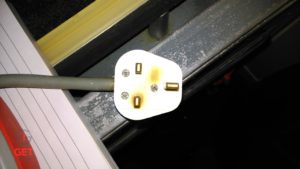From heavy-duty site tooling to sensitive electronics and everything in between, we truly are experts in PAT testing. With no hidden costs, inclusive of items such as replacement fuses, new 230v plugs where required and minor repairs our simple pricing structure is easy to understand and won’t land you with any hidden surprises.
With £2,000,000 public liability & professional indemnity
Same great service for blue chips or sole traders
Engineers qualified City & Guilds 2377 22 & 32
Testing arranged to cause minimum business disruption
Call us today on 0115 727 0160 or Get a Quote online
What is PAT testing?

14 Amp machine found with a 13 Amp plug top during PAT testing. Would’ve started a fire if it hadn’t been found in time.
PAT testing is a process where mains electrical appliances are routinely tested for safety. Also known as ‘in-service inspection and testing of electrical equipment’, portable appliance testing is made up of a series of smaller tests, including a thorough visual inspection (over 95% of unsafe appliances are highlighted at this stage), earth resistance & continuity tests, an insulation resistance test and in some circumstances (power cords & extension leads) a polarity check. Combined with regular user-checks, this process is used to reduce risk within businesses of all descriptions.
Quick Quote
Why do I need PAT testing?
Put simply, each business has duty of care towards its employees and members of the public that may visit the site to ensure the electrical equipment they may come into contact with is maintained in a safe manner. PAT testing is not mentioned explicitly in UK law, but several legal acts [1, 2, 3, 4] come into play, and one way to fulfil the requirements of these acts is to regularly test. Insurance companies or your landlord may also specify that you must test, or ‘take all reasonable precautions’ to ensure safety standards are met.

This machine had been pushed up against a wall daily after cleaning so many times it split the flex open. If left the brown protective cover on the live wire would have become exposed

Whoever wired up this homemade 110v extension lead didn't bother to connect the earth pin.
How often do I need PAT testing?
Well that’s up to you! The idea that it must be done once per year is a myth that has been perpetrated over the years by hard-selling & cold-calling PAT test companies. It is actually up to the duty holders to risk assess the different types of appliances they have within their companies, and the different types of environments they are used in and make an informed decision. The Institute of Engineering & Technology issue guidelines as a starting point, and if you are unsure we’re happy to help and advise our customers with this at no-extra cost.
Is your PAT testing due? Get in touch for a quotation or to arrange a site visit
Call us today on 0115 727 0160 or Get a Quote online
Frequently Asked Questions
What needs PAT testing?
Any appliance with a mains electricity input requires PAT testing. Items powered by a plug & socket setup, hard-wired via a fused spur or supplied via a kettle lead.
Do I need to PAT test new appliances?
Most of the time, no. New equipment should be supplied in a safe condition and will have the same tests and more when they leave the factory. Depending on your circumstances, you may be refused entry to a site with equipment that doesn’t have a valid PAT testing certificate.
I’ve got a rental property – do I need to PAT test?
If you provide any appliances as part of the rental agreement, you have a duty to ensure they are in a safe condition. The easiest way of doing that is to perform regular PAT testing.
Retest frequencies of 24 months or at change of tenancy are recommended. If you are in certain areas of Nottingham City you may need to go through the selective licensing procedure and PAT testing should be kept up to date to keep this and sometimes, your landlord insurance, valid.
[1] The Health and Safety at Work etc. Act 1974 - HSE Website
[2] The Management of Health and Safety at Work Regulations 1999 - legislation.gov.uk Website
[3] The Provision and Use of Work Equipment Regulations 1998 - HSE Website
[4] The Electricity at Work Regulations 1989 - HSE Website